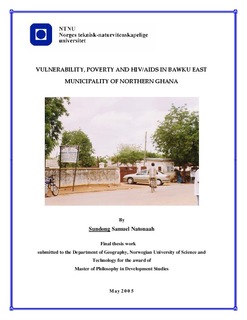| dc.contributor.advisor | Jørgensen, Stig | nb_NO |
| dc.contributor.author | Sundong, Samuel Natonaah | nb_NO |
| dc.date.accessioned | 2014-12-19T14:24:52Z | |
| dc.date.available | 2014-12-19T14:24:52Z | |
| dc.date.created | 2005-12-19 | nb_NO |
| dc.date.issued | 2005 | nb_NO |
| dc.identifier | 125788 | nb_NO |
| dc.identifier.uri | http://hdl.handle.net/11250/265011 | |
| dc.description.abstract | This is a study about vulnerability and risk of HIV/AIDS in Bawku East municipality of northern Ghana. The main objective of the study is to examine poverty as a likely determinant of HIV/AIDS. It also includes other factors which are contributing to the risk of HIV infection in the municipality.
The study makes use of concepts and perspectives linked to the risk theory, the human disease ecology model and ideas generated from structuration, diffusion theory and place and time.
The triangulation approach which encompasses multiple methods of data collection included questionnaire administration covering a purposive sample of 120 respondents, 12 in-depth interviews, focus group discussions and observations. Primary data was complemented with secondary data from Ghana sentinel HIV/AIDS data, statistics on PLWHA in Bawku and other sources of data.
The relationship between poverty and HIV/AIDS is complex. The prevailing poor conditions have led to various ways of coping with life. The study reveals that such livelihood strategies might catapult the risk of infection of HIV/AIDS among the vulnerable. Women are more at risk and are likely to adopt risky sexual behaviours that could put them in high positions for infection. The study reveals that women’s socio-economic dependence on men constrains them in negotiating protective sex.
The study further reveals that there are a wide range of cultural beliefs and practices that fuel the spread of HIV/AIDS in Bawku. The high value placed on marriage and the recognition of many children, widow inheritance, arranged marriages, bridal dowry, polygamy, female circumcision and religious beliefs in particular weaken the autonomy of women and deprive them the rights to decision making in the household. Early initiation of sexual intercourse and the number of sexual partners involved is also reported to be very high. A regression analysis performed on possible variables indicated significant positive association between age and personal monthly income with multiple sexual partners. It is recommended that HIV/AIDS prevention programmes should not only promote condom use but also initiate projects that will address the socio-economic, religious and cultural issues that entrap people putting them at greater risk of HIV infection. | nb_NO |
| dc.language | eng | nb_NO |
| dc.publisher | Fakultet for samfunnsvitenskap og teknologiledelse | nb_NO |
| dc.subject | SOCIAL SCIENCES | en_GB |
| dc.subject | Master of Philosophy in Development Studies, specialising in Geography | en_GB |
| dc.subject | samhälle/juridik | en_GB |
| dc.title | Vulnerability, Poverty and HIV/AIDS in Bawku East Municipality of Northern Ghana | nb_NO |
| dc.type | Master thesis | nb_NO |
| dc.source.pagenumber | 161 | nb_NO |
| dc.contributor.department | Norges teknisk-naturvitenskapelige universitet, Fakultet for samfunnsvitenskap og teknologiledelse | nb_NO |
